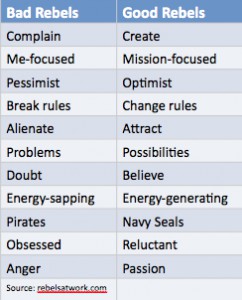Most of our focus at rebelsatwork.com is on employees trying to make change from below. They have it rough and don't have many resources to help them. But we recognize that not infrequently the Rebel at Work can also be a manager, even a leader of an organization. Steve Jobs, of course, comes immediately to mind. Often leaders try to prod their organization to a better future by painting a vision of a new business model only to struggle to push everyone there. When I was in the Intelligence Community trying to do something similar, I would often refer to the Keystone Kops to illustrate our challenge. In the silent Keystone Kops one-reelers, there's often a scene where a truck of Kops in pursuit of dastardly criminals turns a sharp corner and several of the Kops fly off. My goal, I would tell people, was to turn our sharp corner but keep everyone on the truck. We're all getting there together. Easier said than done. Last week the New York Times fired their editor, Jill Abramson, and charges have been flying around ever since as to the reasons why. I don't know why, of course, but I was struck by the analysis provided by another prominent female editor, Susan Glasser, editor of Politico Magazine. In her article, Glasser posits that Abramson, and the editor of Le Monde, who was also forced out last week, were caught up in the strong backlash that can often beat down a leader trying to take their obstinate organization to a place it doesn't think it needs to go. Glasser can't prove her conjecture, but she writes convincingly of her own predicament when she tried to lead the Washington Post to a digital future. Glasser's description of what confronted her is painful to read.
Easier said than done. Last week the New York Times fired their editor, Jill Abramson, and charges have been flying around ever since as to the reasons why. I don't know why, of course, but I was struck by the analysis provided by another prominent female editor, Susan Glasser, editor of Politico Magazine. In her article, Glasser posits that Abramson, and the editor of Le Monde, who was also forced out last week, were caught up in the strong backlash that can often beat down a leader trying to take their obstinate organization to a place it doesn't think it needs to go. Glasser can't prove her conjecture, but she writes convincingly of her own predicament when she tried to lead the Washington Post to a digital future. Glasser's description of what confronted her is painful to read.
"In the course of my short and controversial tenure in the job, I learned several things, among them: 1) print newspapers REALLY, REALLY didn’t want to change to adapt to the new digital realities; 2) I did not have the full backing of the paper’s leadership to carefully shepherd a balky, unhappy staff of 100 or so print reporters and editors across that unbuilt bridge to the 21st century;"
She goes on to write:
"I have no wish to relitigate a painful past episode by writing this, except to say what I learned about myself: It was not the right fight for me, and I didn’t really have the stomach for waging the bureaucratic war of attrition that is the fate of the institutionalist in a time of unsettling change. I had always chafed at the constraints and processes and internal politics of a venerable and proud place. Was I the right person for that job at that time? Clearly not, and I was happy once the ordeal was over, and grateful for the support I received from so many people. I learned that I liked to invent more than reinvent, that it is a better fit for me to create something new than to try to save something old."
That last sentence brought tears to my eyes. I would rather create something new than try to save something old. This realization occurs to so many rebels just at the moment they decide to give up. But I suspect most rebels, perhaps even Glasser, are not being completely honest with themselves. My guess is that they really would rather save, revive something old, but that the personal cost of it just becomes unbearable. Or they are removed because when it comes right down to it, too many people expect change to be easy and not controversial. Even when rebels get "top cover", it is flimsy and easily blown away by the complaints from those who will not be moved.
Much of the criticism of Abramson reminds me of our now almost infamous Good Rebel, Bad Rebel chart. Lois and I have mixed feelings about the chart because it oversimplifies a complex subject. Many rebels have qualities on both sides of the spectrum. And sometimes rebels do have to employ the black arts. Lacking the ability to change minds, they focus instead on trying to create immutable facts on the ground. Rebels who are not also leaders almost never succeed this way. And what we've learned once again is that being a rebel leader doesn't guarantee success.

